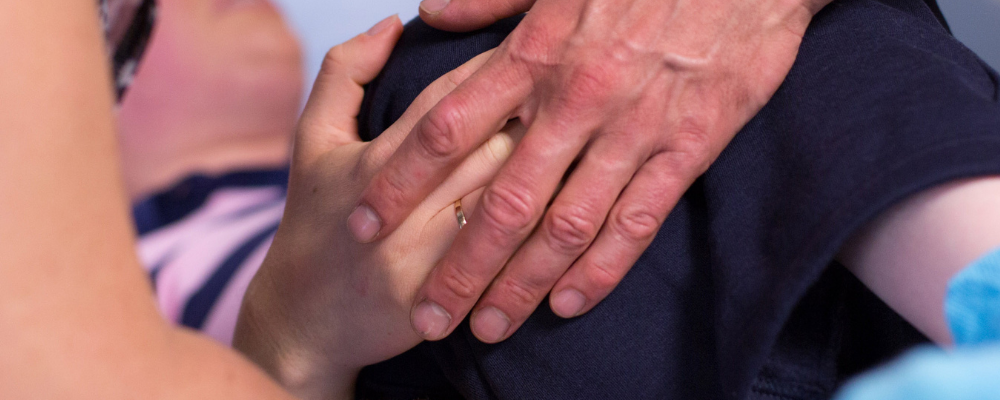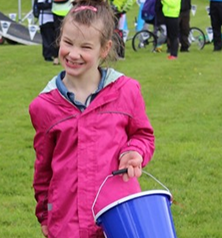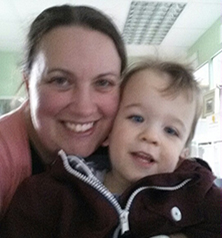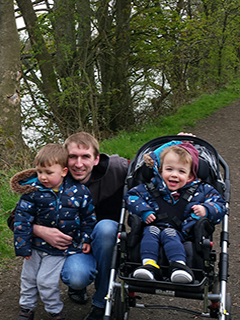Kirsty is 34. As a busy hospital doctor, she’s on her feet constantly and describes what went through her mind before having foot surgery.
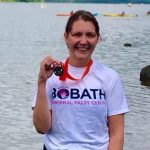 “I was born 10 weeks premature and I have Spastic Diaplegia. I would say it’s quite mild. It’s walking that affects me, balance, co-ordination, that sort of thing. My arms were affected when I was growing up, but my arms are fine now.
“I was born 10 weeks premature and I have Spastic Diaplegia. I would say it’s quite mild. It’s walking that affects me, balance, co-ordination, that sort of thing. My arms were affected when I was growing up, but my arms are fine now.
I was in the Scottish Disabled swimming squad as a teenager. It was really good for me, it was good for my fitness, my confidence and good to meet other people with a disability. When I was thinking about doing Medicine my Guidance teacher told me to recognise my limitations, but I met a girl through swimming with Spina Bifida who walked on crutches and was doing Medicine. It made me think I’ll have a go.
In medicine, you get to work overseas if you want. I did a placement in South Africa and America. That was a thing lots of people thought was a silly idea and it was fine. I did it and enjoyed it and I was fine.
Foot surgery
I walked on my tiptoes until I was 21. My joints were subluxing and I was struggling. I had foot surgery on my right foot and I had my foot realigned and my Achilles Tendon released. At the time, there wasn’t a case study on it. I felt it was worth a go because my feet were the very things that were going to take me off my feet.
When I was 29 I got my left foot fixed. The trouble was it wasn’t a standard operation. It wasn’t a case of, if this goes wrong we’ll do this. It worked out fine for me and my feet are now in a much better position. I now walk heel to toe, there’s less pressure.
First time around when I was younger I underestimated the recovery time. I was in a wheelchair for six weeks, got back on my crutches and walked slowly with a moon boot and 11 weeks after surgery I was off to South Africa and did physio myself.
After the surgery when I was 29 the surgeon told me I had to take three months off work. I think because I was a lot older it took me a lot longer to recovery.
I’m a care of the elderly doctor so I see people coming in their 70s, 80s and 90s falling over so I do worry about what it will be like when I’m older. I’m on my feet with my job and I walk a lot and stay really active so I think that’s probably helped my strength.
Everyone’s different and within reason, I think everyone has to try and keep active. I’ve been a bit lazy and I think like most people in my 20s I wasn’t doing as much exercise so now I’m working towards an open water swim and I try to do other stuff for balance.
I was lucky in my 20s as my job was active I was running around a hospital and I could be on my feet for 12 hours a day. So then when I wasn’t doing that as much I felt that I probably needed to up my own exercise and since doing that I feel a bit stronger and my balance is better.
I fall over, I don’t not do something. If I’m at a wedding and I do a ceilidh dance and I get knocked over my friends just think Kirsty’s fallen over again. I kind of just do stuff. I’m not unsafe, but I have fun. Sometimes you do things and think I can’t do this, but most of the time things can be adapted and people can be very supportive. I’ve got an amazing group of friends.
My mum would say sometimes it’s easier and sometimes it’s harder being only mildly affected by cerebral palsy. I’m trying to keep up with all my peers and sometimes that’s harder because none of them have anything wrong with them.
Deciding whether or not to have surgery
I didn’t think about it too much. I thought my feet are really sore I can’t walk on them as well now. I felt that I had to go for it.
My advice to anyone weighing up the decision to have surgery would be:
-
- Get as much information as you can in a way you understand it.
- Ask what could go wrong in the worst case scenario.
- Find out what is the likelihood of that happening? For me it was difficult because there weren’t case studies behind my surgery. They weren’t sure if they put my foot in a better position they weren’t sure whether it would go back.
- Ask what happens if you don’t do the surgery, what will you lose?
I left it until I felt like I really need it, like the pain and positioning of my feet were such that it was impacting on what I could do. I was thinking about my future too. My whole walking is better now. Although at the time my level of expectation of what surgery could do for me way unrealistic. I think I thought I’d be walking in stilettoes and no would notice I walked differently. I was more realistic when I was older.
Relationships
Where my confidence struggles the most is in meeting people. Relationships are so much a confidence thing. I think it is harder to meet people. Do I put out the vibes of don’t talk to me because I walk a bit funny?
When you’re in your 20s you already feel a little bit less attractive than everyone else because you walk a bit funny and then there may be other functional issues as well. Who do you talk to about that? So you don’t talk to anyone. I spoke to my mum eventually and a few of my friends.
Very little to do with relationships and sexual health with cerebral palsy is discussed. People need to know that if they are having problems there are things that can be done.
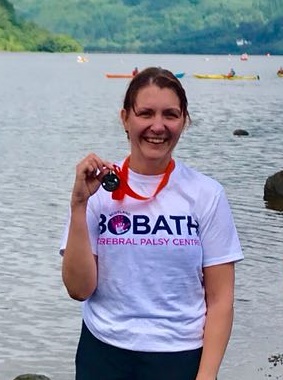
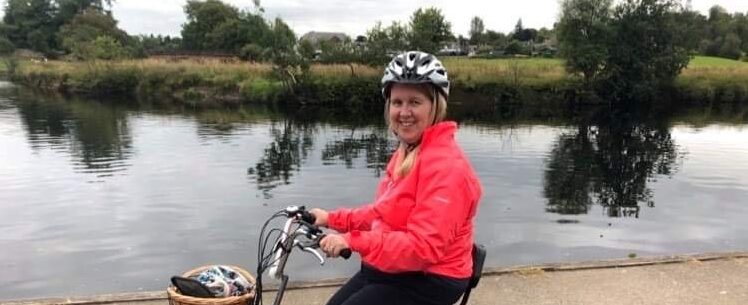

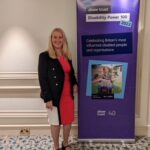 Jenna isn’t just my daughter, she is my friend too, her encouragement, support and love are indescribable and I am very proud to be her mum. When Jenna was young I struggled to cope with lifting and caring for a new baby, I will never forget the help and support I got from family and friends especially my mum at this time. During my maternity leave I decided to complete my accountancy exams and became a fully qualified chartered certified accountant. This was a major achievement for me and although I have the pinstriped suits, the sports car and high heels haven’t worked out. Sports cars are over rated anyway in our West of Scotland climate!
Jenna isn’t just my daughter, she is my friend too, her encouragement, support and love are indescribable and I am very proud to be her mum. When Jenna was young I struggled to cope with lifting and caring for a new baby, I will never forget the help and support I got from family and friends especially my mum at this time. During my maternity leave I decided to complete my accountancy exams and became a fully qualified chartered certified accountant. This was a major achievement for me and although I have the pinstriped suits, the sports car and high heels haven’t worked out. Sports cars are over rated anyway in our West of Scotland climate!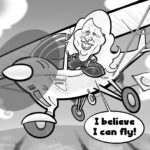 In 2015 I joined the Board of Cerebral Palsy Scotland. It was a privelege to be involved in decision making and represent CP service users. Seeing Bobath Scotland transition to Cerebral Palsy Scotland was a real highlight for me as it created better awareness of the service’s available. In 2022 I retired from the Board but still have a close connection with the charity. During this time I was introduced to Dr Kirsty Colquhoun who also has CP and became a very active Board member. It’s great to have a friend who experiences similar challenges. We are both passionate about seeking solutions to assist people with CP and removing barriers and negative expectations.
In 2015 I joined the Board of Cerebral Palsy Scotland. It was a privelege to be involved in decision making and represent CP service users. Seeing Bobath Scotland transition to Cerebral Palsy Scotland was a real highlight for me as it created better awareness of the service’s available. In 2022 I retired from the Board but still have a close connection with the charity. During this time I was introduced to Dr Kirsty Colquhoun who also has CP and became a very active Board member. It’s great to have a friend who experiences similar challenges. We are both passionate about seeking solutions to assist people with CP and removing barriers and negative expectations.